In this article
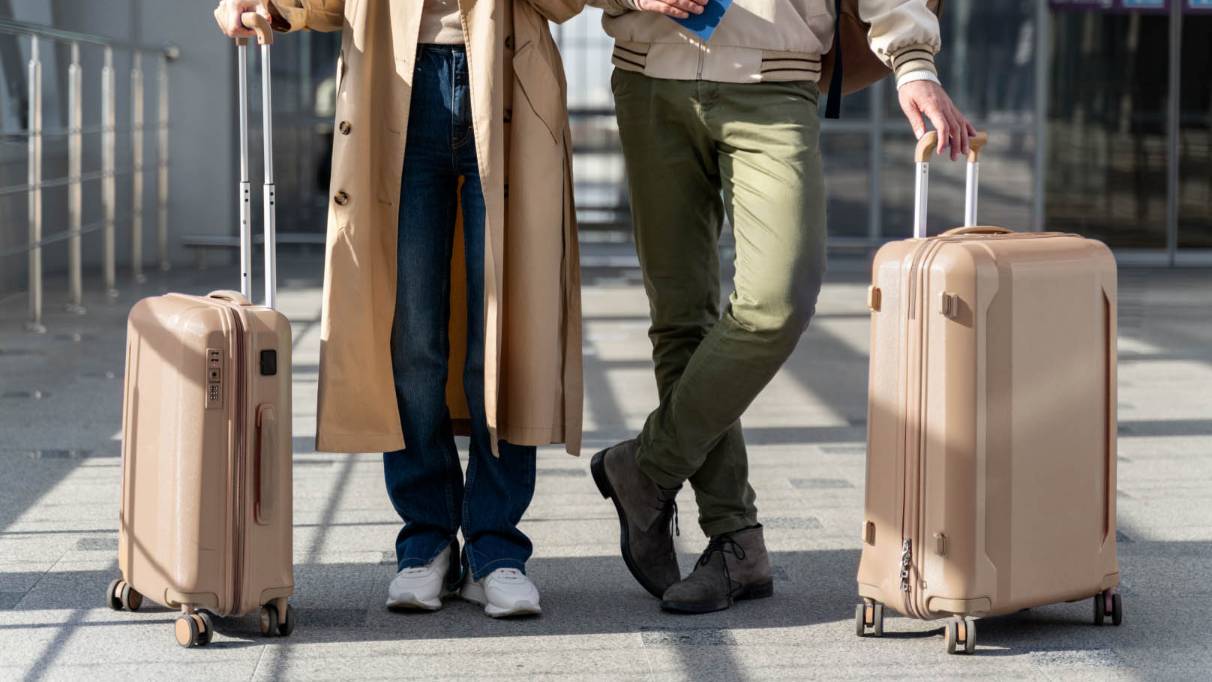
What liquids can I take on a plane?
Security restrictions have been in place for many years to limit the amount of liquids you can take onto planes in your hand luggage. Even so, many flyers remain confused over the amount of food, drink, cosmetics, sprays, pastes and gels they can carry aboard, and how they need to be packed.
The official restrictions are published on the government website, but this guide to taking liquids on flights should help too. It includes the special rules for baby milk and food, special diets, and items you buy once you’re through security. We’ve also included a separate section about medication.
The 100ml rule for liquids
Some airports in the UK and EU have now relaxed the 100ml rule for liquids. They now allow you to carry two litres of liquid in your hand luggage.
But at many airports, the 100ml rule still applies. That means you can’t bring more than 100ml of any restricted liquid into the cabin in a single container. These liquids must also be stored in individual 100ml containers.
Any liquid that you need more than 100ml of should be packed in your hold luggage.
Double-check the liquid rules for your flight before you go.
“Liquids” include:
- Drinks
- Partially or fully liquid foods, such as soup, baby food, or honey
- Toiletries and cosmetics, such as make-up, perfume, creams, lotions, gels, mascara, lip gloss or toothpaste
- Sprays and aerosols, such as deodorant or hairspray
- Gels, such as hair gel or shower gel
- Contact lens solution
- “Any other solutions and items of similar consistency”
Remember, the 100ml limit applies not just to the actual amount of liquid, but also the bottles or containers they are held in.
Protect what matters with good travel insurance
Other things you need to know
- All liquids must be taken through security in a clear plastic bag no larger than 20cm by 20cm. These are normally available for free at airport security terminals
- You can take one clear bag per person, so don’t bring too many liquids even if they’re in containers of less than 100ml
- If you use a lighter, you can take one onboard in the same clear plastic bag. Lighters are not allowed in hold luggage
- You’re not allowed to take containers of more than 100ml through security, even if they’re only partially full. The bag needs to be able to close and be sealed
Can I take alcohol on a plane?
Generally, you can take alcohol on a plane if you’re of legal drinking age. But there are some other important rules you need to know.
- Alcohol under 100ml: You can carry alcohol in containers of 100ml or less in your hand luggage if it fits in the clear plastic bag for liquids. The alcohol must be sealed in its original, unopened container
- Alcohol over 100ml: If you buy alcohol or any other liquids over 100ml after going through security, you’re allowed to take it on your flight. But the bottle or container must stay sealed in the secure, tamper-proof bag provided when you buy it
Some airlines might have their own restrictions on carrying alcohol, so always check before you travel. It’s also important to remember that you’re not allowed to drink your own alcohol on a plane. You can only consume the alcohol served by flight attendants.
Can I take food in my hand luggage?
Yes, you can usually take food in your hand luggage. Here’s some general guidance:
- Solid foods: You can bring most solid food in your hand luggage, such as sandwiches, fruit, vegetables, snacks and pre-packaged food
- Liquid or semi-liquid foods: Foods like soup or jam must be in containers of 100ml or less and fit in your clear plastic bag for liquids
- Baby food and milk: You can bring baby food, breast milk or formula in larger quantities than 100ml. It will be screened separately at security and might be tested
- Medical needs: If you need more than 100ml of liquid for medical reasons, you’ll need a prescription (if it is a prescription medicine) and a doctor’s note to bring it through security
There might be certain restrictions on meat, dairy and other animal products, as well as fresh fruit and vegetables. Always check the specific regulations depending on the countries you’re travelling between.
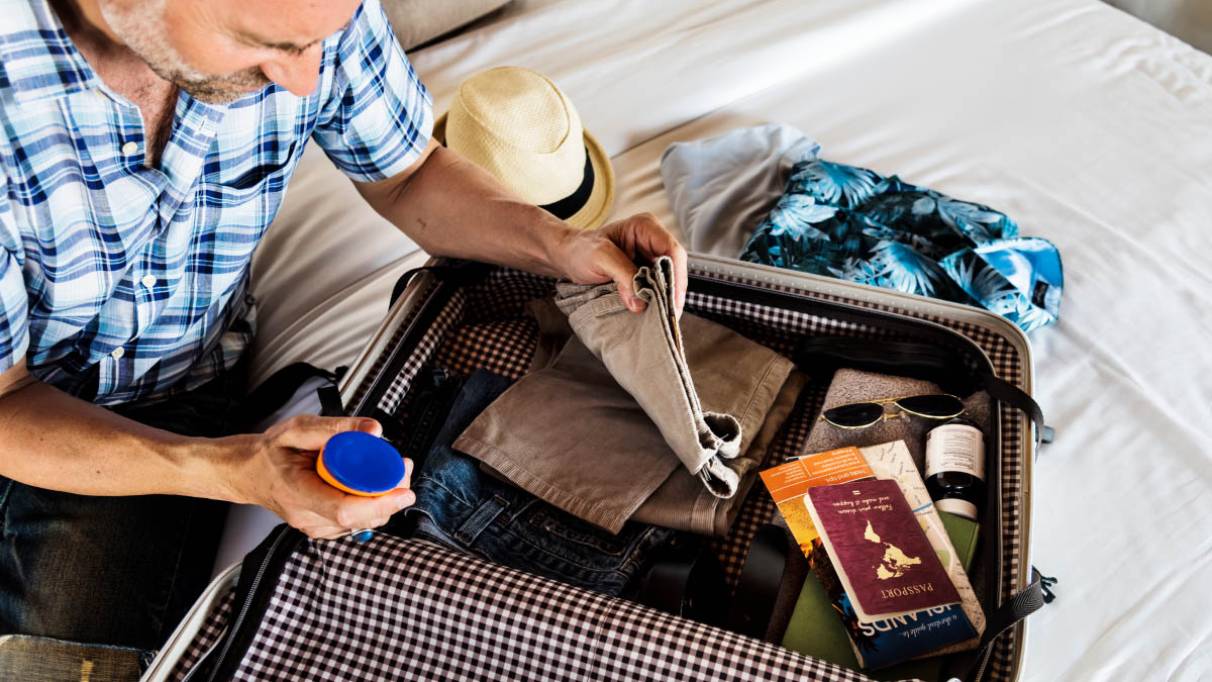
Taking medicines on a plane
Before deciding whether to pack your medicine in your hand luggage or hold luggage, you need to ensure that they’re not prohibited in the country you’re visiting. You might also need approval to travel with them.
If you’re taking prescription medications, contact the embassy of the country you’re travelling to. They may need to give you special permission to travel with medicines that are restricted in their country.
If you travel with medicines that are illegal in the country you’re visiting, even if they are common in the UK, the penalties can be severe. This also applies to over-the-counter medicines as well.
-
Discuss with your doctor
Your GP or travel health specialist will be able to advise on whether you need immediate access to your medicine. If so, it’s no good if it’s bundled away in the hold.
Your doctor can also provide you with a valid prescription and a note explaining why you need the medicine or medical equipment. It’s a good idea to keep a digital copy in case the original gets lost.
Airport security may need to check that your medical equipment is safe for air travel so have your note ready when you’re going through the checks.
-
Taking medicine in hand luggage
If you pack all the medicine you need for your trip in your hand luggage, you’ll be covered in case of delays or if your hold luggage goes missing
Whether you have a large amount or just a couple of pills, it’s important to keep your medication in its original packaging, correctly labelled, and matching your prescription. It’s also crucial to have a copy of your prescription.
You can then have a back-up supply in your hold luggage too, just in case.
If your medicine is a liquid over 100ml or a sharp, like a syringe or EpiPen, make sure you have the necessary documents ready for when you go through security. There are special rules to allow you to travel with medical equipment, so as long as you’ve got everything to hand you shouldn’t have a problem. It just may take a little longer at security. You can always contact your airline in advance to check for any special restrictions.
-
Make sure you look after your wellbeing
Airlines are concerned with the wellbeing of vulnerable passengers. This can include elderly people, those with medical conditions, or anyone needing extra comfort for a host of reasons.
If you’ve recently had surgery or have any other requirements, let the airline know. They might be able to upgrade your seat.
-
Controlled medication
Some medications are controlled substances, meaning that they are only legal in certain situations. Examples include anabolic steroids or painkillers containing opioids, like morphine or codeine. You might need a personal license to travel with these, which you can get from the Home Office. This process can take a little time, so apply at least 10 working days before your travel date. You’ll also need a note from your prescribing doctor explaining why you need the medicine. If you’re unsure, apply early to avoid any issues.
-
Get travel insurance with good health cover
If you need to travel with prescription medicine, it’s especially important to have travel insurance that includes health cover to meet your needs. Before you buy a policy, read the details carefully so that you can pick the right cover for you. Keep in mind that you’ll have to complete a medical screening and disclose any medical conditions and medications you’re taking. You might also need to pay a little extra. If you don't, any medical claims you make could be rejected.
Can I take my gadgets and other tech on a plane?
Generally, you can bring small electronic devices such as laptops and tablets in your hand luggage without any issues. In the past, certain countries required electronics to be checked in but that rule has been lifted. At security, you might be asked to take any tech out of your bag and pass it through the scanner separately. pack your items in a way that lets you quickly access them. You might need special permission to take some electrical items, such as medical equipment, on flights. Talk to your airline and GP or consultant for more advice.
Now that you can travel internationally with as little as your phone and your passport, it’s important that your devices have enough battery life to last through your journey. Not all gadgets are essential, but they can help you have a more comfortable travel experience. Make sure your devices are fully charged and take your charger or power bank in your hand luggage.
Travel tech checklist
- Phone
- Chargers
- Country adaptors
- Portable battery pack
- Data bundle for the country you’re visiting or if your flight's delayed
- Noise-cancelling headphones, but make sure you don’t miss announcements
- Electric toothbrush (and less than 100ml of toothpaste)
Don't forget a pen and paper, too. They're important to remember in case all else fails.
Can I take my pets on a plane?
It’s not always easy or practical to find a place for your pets while you’re away, especially if you’re away on a long trip. And besides, you might want nothing more than your best friend by your side.
There are international rules and airline rules for transporting pets, so it’s important to know both.
Can my dog or cat fly in the cabin?
Whether your dog or cat can fly with you, and whether that’s in the cabin or the hold, depends on the airline.
It’s important to check their policies and costs before you book, if having your pet with you is essential for your trip. The government also has a list of airlines and airports that allow pets.
It’s common to see dogs in the cabin as some airlines relax their approach to pets onboard. Even those that don’t typically allow dogs in the cabin will usually make an exception for guide and other assistance dogs, which can often travel for free.
If your pet is able to fly, make sure you’re clear where you need to take them and when. If they’re flying in the hold, you may need to take them to a cargo rather than a passenger terminal.
International rules for travelling with pets:
- If you’re taking your pet to the EU or Northern Ireland, pet passports issued in the UK are no longer valid. Your pet will also need to be microchipped. They’ll also need to be vaccinated against rabies and recently treated for worms
- You’ll also need a valid animal health certificate (AHC), which you can get from your vet. It may take a few days to process, so the government recommends applying for your pet's AHC at least one month before you plan to travel
- Taking your pet outside of the EU will depend on the country you’re visiting. Contact the embassy of that country for information about what certifications your pet needs
- Make sure your pet has a suitable and comfortable carry case for the trip, whether they’re in the hold or the cabin. They’ll also need plenty of water
- Travelling in the hold, or even travelling at all, can be a traumatic experience for animals. Consider finding another way to get your pet to your destination that involves less discomfort and stress
- Pet insurance policies offer limited coverage for pet travel. However, this requires your pet to be allowed to travel. If you travel with your pet without the necessary approvals, you might invalidate your insurance
Baggage allowances
It’s all too easy to get stung by an unexpected fee for a bag that’s an inch too big for your hand luggage or a suitcase that’s a few grams too heavy for the hold.
Each airline will have a different set of allowances and restrictions for hold and hand luggage. These can vary from route to route and might change at short notice, as can charges for excess baggage.
Avoid any nasty surprises at the airport by knowing your luggage restrictions and double-checking your baggage allowance on your airline's website. Remember to pre-book any excess charges to make sure you always pay the lowest fees.
Hold luggage
You can put almost anything you own in the hold of a plane, including pets, bikes, musical instruments and even coffins. But remember, each airline has a strict set of restrictions for hold luggage allowances, which could end up costing you a lot of money if you ignore them.
Most airlines will let you check as many heavy bags as you like into the hold. But they will usually charge you an excess fee, which is always higher at the airport than online. If you’re planning on flying with a lot of hold luggage, make sure you pre-book your extra bags before you leave home. Most airlines let you do this when you book your ticket, and they often give you a second chance when you check in online.
If you’re flying with anything valuable in the hold, make sure it’s covered by your travel insurance policy. Special items, including golf clubs, skis and business equipment, might be listed as optional extras, so it’s worth checking that your policy schedule carefully. Look for golf equipment cover and ski cover before you pack.
Avoiding excess baggage allowance charges
To avoid paying extra for your hold baggage, follow the airlines rules carefully. At the airport, your checked bags will all be weighed and sometimes measured to make sure they meet the airline’s restrictions. Simply put, if you don’t want to pay for any extra baggage, don't bring any with you. Weigh your packed bags at home before you leave and make sure they’re not over the limit.
You can weigh a packed suitcase easily enough by buying a set of luggage scales, which is generally less than £5 online, and often available at airport shops. But don’t make the mistake of filling your suitcases right up to the weight limit. Leave some room if you plan on bringing back any gifts or souvenirs.
Cover your next adventure with travel insurance
Other travel products
-
Travel money
Order foreign currency online or in selected branches. Pick up in any branch or get it delivered to your home.
-
Travel money card
One prepaid Mastercard™ that stores up to 22 currencies.
-
Passport Check & Send
Get your passport application right the first time. We can even complete and submit it for you digitally.
This might interest you
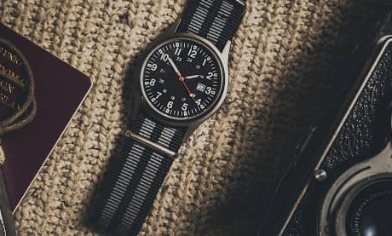
How to protect your travel documents
While it’s useful to take hard copies of travel documents away, you can minimise your worry and risk. Here are some handy tips on keeping your travel documents safe.

Travelling during your pregnancy
Before your little bundle of joy arrives, you may be considering taking a holiday. But is it safe? And what precautions should you consider before making a booking?

How to travel with your dog
Taking your best friend on holiday with you is everyone's ideal situation, but travelling with a dog can be a complicated process. Make sure you know how.
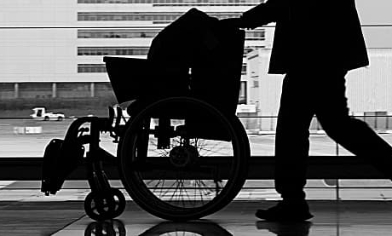
How to get assisted travel at airports
Lots of people who need assisted travel at airports are missing out simply because they don’t know how to go about asking for it.

Don't make these holiday mistakes
Booking a last-minute holiday can get the blood pumping with the sudden thrill of adventure, but it also makes it easier to overlook things.

How to pack a suitcase
Whether you’re heading to the beach for a much-needed break or boarding a boat for a cruise somewhere breath-taking, it’s important to know what to pack in advance so you’ll have everything you need.

10 tips for keeping kids safe on holiday
We all know the feeling – getting to the airport, then a wave of panic comes over you. Did you remember your passport? What time's the flight? And where on earth did you put the kids?

10 ways to look after your valuables at the beach
The whole idea of lounging around on the beach is to switch off and enjoy the sunshine. But the reality is that opportunistic thieves are on the lookout for unattended valuables, and it’s important to make sure you’re protected.

Is Airbnb safe? Tips on staying safe
The arrival of Airbnb has helped to transform the travel industry in recent years. On any one night, over two million people stay in homes advertised through Airbnb in 65,000 cities around the world.
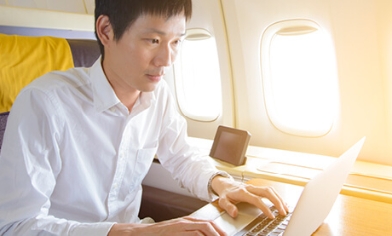
How to get a free flight upgrade
There are several ways to get to the top of the class on your flight – whether that's business or even first.

Lost and costly: What UK holiday-goers lose most on holiday and how to avoid it
A surprising number of items get lost on holiday. Learn what you can insure and how to keep it safe.

Top tips for going to festivals overseas
With festivals overseas becoming the new norm, festivalgoers need to do a bit more planning than for a UK festival.
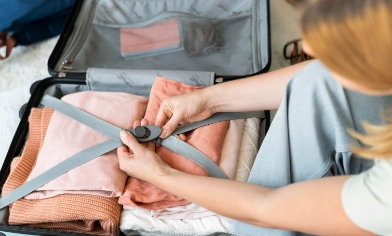
Travel hacks to help save money on your holiday
Satisfy your travel craving while making your holiday budget go further.

Travel insurance for New Zealand
Find out what medical care Brits can access in New Zealand and travel risks to be aware of like natural catastrophes, however rare.

8 tips on staying safe while you enjoy your winter sports
The white stuff is alluring, so make sure you can enjoy it safely, are ready for the unexpected and pack travel insurance for extra reassurance.

Travel insurance for seniors and travelling with grandchildren
Read our guide to travelling in later life. We explore what to look for in your travel insurance, plus taking trips with your grandchildren.

Travel insurance for Turkey
A trip to Turkey offers toasty beaches and tourist treats aplenty. No wonder it’s so popular with holidaymakers from the UK and elsewhere.

USA travel insurance
Discover top places to visit, tips on staying safe and why travel insurance is essential for an unforgettable USA adventure

What is ABTA?
Over 60 million people travel from the UK most years for holidays or business. The vast majority enjoy smooth, trouble-free journeys. Sometimes, though, things go wrong.

Teen travel: holiday ideas for teenagers and tips for parents
Travel can help teenagers grow and discover new places. This guide shares the best trips for teens, advice for those travelling independently for the first time, plus tips for parents too.

Where is hot in September, October and November?
Looking for holiday destinations that promise warmer days as UK temperatures start to fall? We can help with that.

Spain travel insurance
Discover some top places to visit in Spain, tips on staying safe while you’re there and why travel insurance is essential for an unforgettable Spanish adventure.

Travel insurance for Thailand
Thailand’s idyllic beaches, azure-blue sea, buzzing cities and exciting alternative scene are a draw for Brits. A trip can be a once-in-a-lifetime event.

Travel tips for babies, toddlers and young kids
Travelling with kids? Before you get on the plane, read our quick and easy guide to help make sure your journey runs smoothly.

Post Office Travel Insurance Winter Sports Survey
With the winter sports season upon us, we conducted a Winter Sports Survey for the second year running. It found as many as four in 10 UK travellers (39%) planned to take up a winter sports activity this year, with 25% keen to go skiing. It also emerged that many prefer winter escapes to summer ones. But has the nation considered all the protection we need for winter sports holidays? Or are we woefully underprepared?

Winter sun holiday destinations to escape to
Looking to escape the chilly UK winter? Our Winter Sun Survey reveals the top sunny destinations UK travellers are choosing this season. And learn why travel insurance is key for a worry-free holiday in the sun.

Where is hot in December, January and February?
Looking for holiday destinations that promise warmer days in the UK’s colder winter months? We can help with that.

Great tips for people travelling alone
Whether you’re travelling solo because of business, you’re hoping to meet someone, or simply because you enjoy it, being by yourself can sometimes be a daunting prospect when you’re abroad.

Travelling without insurance: Why you should never take the risk
If you’re thinking of heading abroad without insurance, think again. This guide explains why doing so can be risky, busts common myths about the need for insurance and shows how easy it is to protect yourself.
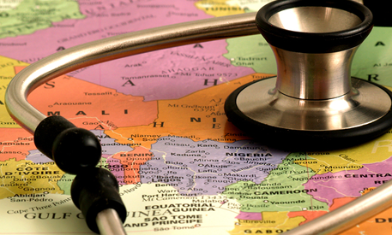
Do I need travel vaccinations?
There’s no better feeling than planning an amazing trip to an exotic destination. Make staying safe with travel vaccinations top of your to-do list.

Where is hot in March, April and May?
Spring is a great time to leave the cooler UK and go somewhere sunny. And we can help with that.

Schengen travel insurance for UK travellers
There are different rules for travelling to the Schengen Area from the UK since Brexit. If you’re visiting this part of Europe, find out if you need a Schengen visa and travel insurance.

The Travel Safety Index for Solo Travellers
Travelling solo means freedom and independence, making new connections and never having to compromise.

Travel insurance for South Africa
How safe is South Africa to visit and why is having travel insurance important when you go? Our guide looks at the potential travel risks and the cover you may want to look for in a policy.
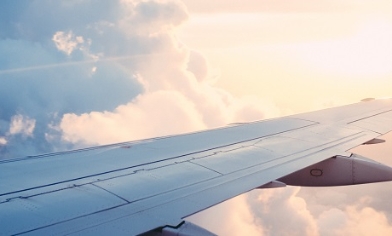
What is ATOL protected?
ATOL stands for Air Travel Organisers' Licensing, a scheme that helps make sure consumers are covered if travel firms fall into financial difficulties.

Vaccinations needed for Thailand
Some vaccinations for Thailand are recommended and some are mandatory in certain circumstances. It’s important to know which vaccinations or injections for Thailand you need to get before you leave home.
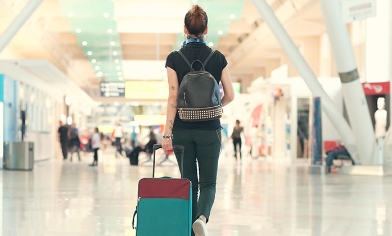
When to buy travel insurance
Do you need travel insurance for your trip? Is travel insurance worth it? And, if yes, when is the right time to buy cover?
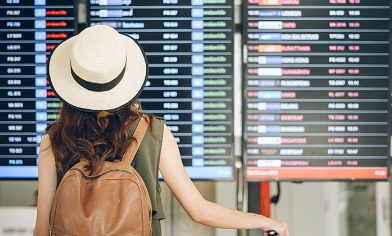
Safe travels: where can I go on holiday?
Travel’s a great way to unwind, see the world, open the mind and expand horizons. But rapidly changing situations around the world can soon impact such plans.

Find hot holiday destinations any time of year
If you're the type of sunchaser who looks forward to that sizzling summer break, can’t wait to escape to warmer climes in the UK’s winter months or can't be away from vitamin D too long, we’ve got a few ideas about where to go.

Australia travel insurance
Find the best places to visit in Australia, tips on staying safe and why travel insurance is a must for your trip.
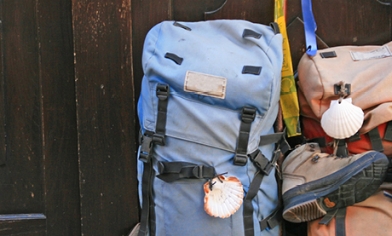
A complete list of backpacking essential items
Going backpacking is one of life’s great adventures. But before you set off you’ll need some packing tips so you're not weighed down on the way.

Travel insurance for the Balearic Islands
It’s one of the most popular holiday hotspots for UK holidaymakers. But what can you expect from a trip to the Balearics?

Getting travel insurance for an adventure holiday
Adventure holidays come in all shapes and sizes. They can be full of action or just include a few activities, depending on the type of getaway you’re going for.
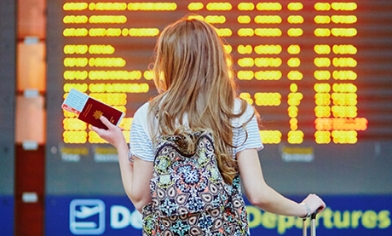
What to do if your airline or holiday company goes bust
Finding out that your airline or holiday company has gone bust is a shock – especially if you’re on holiday at the time. But there are plenty of laws and regulations in place to protect you and your family from losing what could be a lot of money.

What is the best month for a Caribbean cruise?
Dreaming of turquoise waters and sun-kissed beaches? Planning the perfect Caribbean cruise starts with choosing the right time to go. This guide explores the best month for a Caribbean cruise, what weather to expect and how to prepare.

How many bank holidays are there in the UK?
Bank holidays are special days off when many people in the UK don’t work. They’re a great chance to relax, travel, see family or catch up on things.

Top cruise destinations for your bucket list
Ever dreamed of sailing to the world’s most exciting places? Cruises can make that happen.

Travel insurance for Cuba
Today, Cuba is more accessible than it has been for many decades, and those who decide to holiday there can expect a mixture of colourful city life and luxurious beaches.
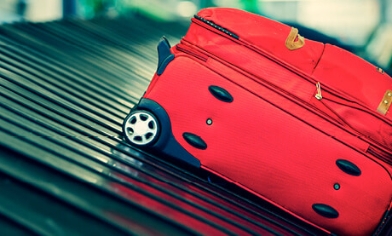
What you should do about delayed, lost or damaged luggage
The last thing you want to happen on holiday is standing the luggage carousel at the airport waiting for bags that don't appear. It's a huge inconvenience that can cost you time, money and a lot of stress.

Travel insurance for Egypt
Make sure you’re travelling safely in Egypt with the latest advice and risks, and learn about getting around and local culture.

European and Global Health Insurance Cards
If you're travelling to an EU country from the UK, make sure you take a Global Health Insurance Card (Ghic) with you or existing European health Insurance Card (Ehic), if it's still in date. You'll need them to access free healthcare during your stay, should you need it.
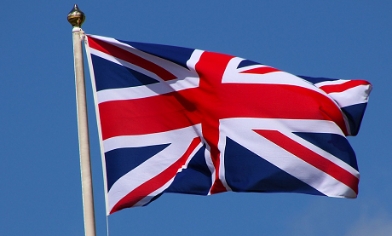
Everything you need to know about embassies
Learn the difference between embassies and consulates, and why you might need them when travelling.
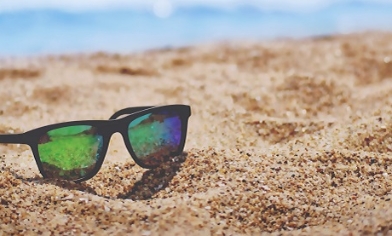
Travel insurance for diabetics
You should be able to get the right cover to travel abroad if you’re diabetic, making sure that your medical needs are taken care of.

Travelling while you work or vice versa with nomad travel insurance
It’s easier now to mix business and leisure travel. Whether you’re planning a bleisure trip, taking a workation or exploring life as a digital nomad, there are more options than ever to work from anywhere with nomad travel insurance.

Do I need travel insurance for a UK break or staycation?
Travel insurance for a holiday in the UK isn't something you must have, but it might be something you want to have.

Travel insurance for Dubai
Discover top places to visit, tips on staying safe and why travel insurance is essential for an unforgettable Dubai adventure.

Family travel insurance
Going on a trip with your family is a great way to spend time together. It could be a holiday, a weekend away or a big trip abroad.
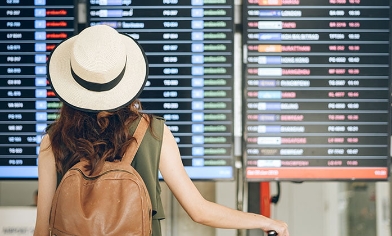
Flight delays and compensation
Most of the time, getting a flight is a hassle-free event. If you only take hand luggage, have your boarding pass saved to your phone and everything’s running to plan then you can breeze through security and hop on your flight with little fuss.

Travel insurance for France
It may be a short hop away, but a trip to France is not without its travel risks. Make sure you’re clued up on what they are and have travel insurance in place to help protect you, so you can concentrate on just enjoying your break.

Gap year travel advice for solo travellers
Exploring the globe can be scary, but there’s so much to find at the edge of your comfort zone. We look at some of the top destinations to visit on your own – and share tips on how to keep safe when you go.
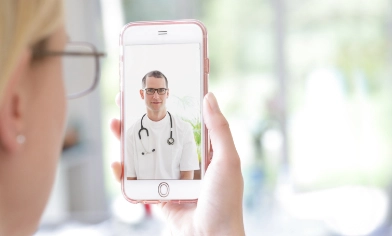
Don’t let illness spoil your perfect holiday – book an online doctor
There’s nothing worse than falling ill while away from home. Along with the worry of the cost of visiting a doctor and getting treatment, being poorly can put a real dampener on your trip.

Travel insurance for Mexico
Find out about medical care available to Brits in Mexico, as well as travel risks, transport options and the importance of taking travel insurance.

Travel insurance for Morocco
Perched on the northern tip of Africa, Morocco’s long been a popular destination for UK holidaymakers. If you’re heading there soon, make sure you’ve got good travel insurance to cover you.

Travel insurance for India
For many UK holidaymakers, India is an intriguing and diverse culture with colourful traditions and engrossing history. For many others, it’s a home from home.

Travel insurance for Ireland
Do UK residents need travel insurance for Ireland? And what healthcare is available for Brits if they’re visiting the country?

Travel insurance for Italy
Find out about the safety of travelling to Italy as well as the medical care available to Brits and how to get around.

Travel insurance for Japan
If you’re jetting off to Japan soon make sure you have good travel insurance to cover your trip. The right policy may offer more protection than the standard medical care UK citizens can access when they visit.

Travel insurance for cancer patients
If you're living with cancer but love to travel, can you get travel insurance for your trip?

Kids’ travel insurance
It’s exciting when your child takes their first trip without you. Whether it’s a school visit, a holiday with friends or a gap year adventure, you’ll feel proud… but it’s normal to worry too.

Compare our travel insurance
Travel insurance is essential for any trip. It can help protect you from things like flight cancellations, medical emergencies and lost luggage.

Understanding cruise travel insurance
Thinking of going on a cruise? Learn how cruise travel insurance protects you from unexpected events on board, at sea and on land, for smooth sailing and a stress-free experience.

Travel insurance for Greece
Greece and the Greek islands have long been a popular travel destination for us Brits. But are there any travel risks or other factors to keep in mind before and when you go?
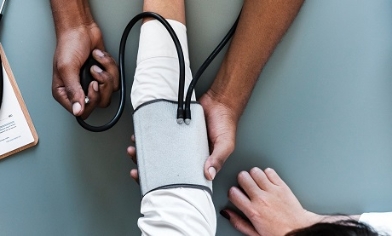
Travel insurance for people with high blood pressure
Travelling with high blood pressure is fine – but it’s important to make sure you’ve got the right cover in case something goes wrong abroad.
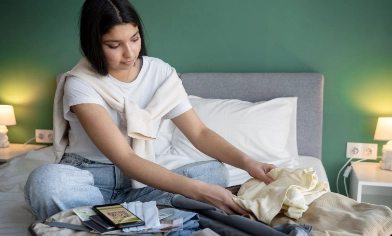
Holiday packing and pre-travel checklist
So, you’ve booked your flights, accommodation and activities. What next?

Travel insurance for Canada
Canada is a vast country of diverse delights – everything from bustling cities to snow-capped mountains, deep forests and crystal clear lakes. If you're thinking of experiencing them, it's time to consider your travel insurance.

Travel insurance for the Canary Islands
People flock to the Canary Islands from all over Europe. No wonder, with such appealing beaches, landscapes and temperatures to enjoy.

6 steps to help protect your home when you’re away
Learn how to secure your property when you're not at home. Follow these steps to deter burglars, prevent other issues and keep your home insurance valid.
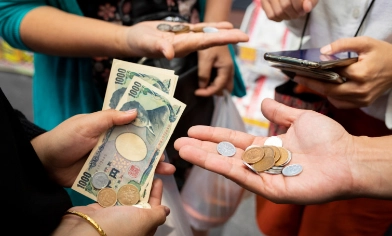
10 money and travel scams to avoid on holiday
Scammers are getting smarter, but you can stay one step ahead of them on your holiday by knowing what tricks and traps to watch out for.

Where and how much to tip abroad
Understanding if and how to tip when you’re travelling can be tricky, especially with different customs around the world.

Travel money: How to make the most of your money on holiday
Jetting away? Don’t forget your travel money. Whether you’re planning to pay with foreign currency, a prepaid travel card or both, getting savvy about your spending could help save time and money.
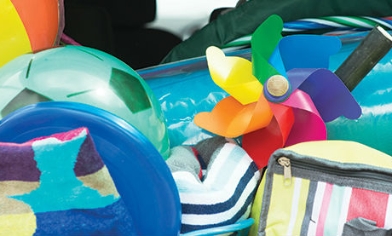
Avoid dynamic currency conversion
To avoid currency conversion fees abroad, always choose ‘local currency’ whether you’re withdrawing cash from an international ATM or spending on a prepaid travel money card.

Budgeting and planning for travel in your gap year or career break
Taking a gap year or a career break is an exciting opportunity to explore the world, experience new cultures and make memories to last a lifetime. But there’s a lot to think about, and careful planning and budgeting are essential.